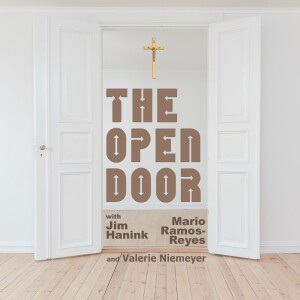
Episode 237: Dr. Andrew Cummings of Mount Angel Seminary (June 15, 2022)
 2022-06-17
2022-06-17
Download
Right click and do "save link as"
This week on The Open Door, Catholic panelists Jim Hanink, Mario Ramos-Reyes, and Christopher Zehnder discuss with Dr. Andrew Cummings teaching philosophy at the oldest seminary in the West, Mt. Angel Seminary, Oregon. And, of course, we’ll explore what’s being taught, from the classics to the contemporary. Our special guest is Prof. Andrew Cummings. He received his PhD from the University of Leuven, Belgium. His research centers on topics in philosophical theology, metaphysics, and the history of ideas. It comes alive in articles like “Don Quixote Meets Mr. Gradgrind: A Neglected Proof for Immortality” (Logos), and it brings us into the quest for dialogue with our cultured (or not) critics. Among the questions we’ll ask are the following. Please feel free to add your own!
Prof. Cummings, Andrew if we may, could you tell us a bit about yourself?
How did you come to teach and Mt. Angel Seminary? And how does the Benedictine Tradition shape your institution?
You wrote a book (Thinking God) with your father. What was that like? Were there “philosophical differences” between the authors?
Joe Friday, of Dragnet fame, was fond of saying “Just the facts, Ma’am.”
But aren’t facts value laden? And aren’t some values themselves facts?
Are we metaphysical animals?
Metaphysical or not, animals die. What do you make of Karol Wojtyla’s observation, in his Person and Community, that the immanent good of our actions endure? He writes that “Not only do the traces of it that have remained in human culture themselves defy death, for they live on and re-enliven ever new men and women, but they also seem to call for the immortality—and perhaps even testify to the personal immortality—of the human being.”
The American Solidarity Party, increasingly known in Catholic circles, presents itself as in the tradition of Christian Democracy. Its leaders make use of natural law arguments that emphasize the common good. Is such an enterprise quixotic or prophetic? Or is it simply “right reason in acting”?
Was Martin Luther King, Jr., ill-advised to appeal to natural law reasoning in his “Letter From Birmingham Jail”? Was Dorothy Day ill-advised to speak about sacrificial love in the public square?
What is at stake in the virtue of civic friendship?
Can you tell us about some of your current projects?
view more
Prof. Cummings, Andrew if we may, could you tell us a bit about yourself?
How did you come to teach and Mt. Angel Seminary? And how does the Benedictine Tradition shape your institution?
You wrote a book (Thinking God) with your father. What was that like? Were there “philosophical differences” between the authors?
Joe Friday, of Dragnet fame, was fond of saying “Just the facts, Ma’am.”
But aren’t facts value laden? And aren’t some values themselves facts?
Are we metaphysical animals?
Metaphysical or not, animals die. What do you make of Karol Wojtyla’s observation, in his Person and Community, that the immanent good of our actions endure? He writes that “Not only do the traces of it that have remained in human culture themselves defy death, for they live on and re-enliven ever new men and women, but they also seem to call for the immortality—and perhaps even testify to the personal immortality—of the human being.”
The American Solidarity Party, increasingly known in Catholic circles, presents itself as in the tradition of Christian Democracy. Its leaders make use of natural law arguments that emphasize the common good. Is such an enterprise quixotic or prophetic? Or is it simply “right reason in acting”?
Was Martin Luther King, Jr., ill-advised to appeal to natural law reasoning in his “Letter From Birmingham Jail”? Was Dorothy Day ill-advised to speak about sacrificial love in the public square?
What is at stake in the virtue of civic friendship?
Can you tell us about some of your current projects?
More Episodes
WCAT Radio The Open Door (August 3, 2018)
 2018-08-03
2018-08-03
 2018-08-03
2018-08-03
WCAT Radio The Open Door (July 27, 2018)
 2018-07-28
2018-07-28
 2018-07-28
2018-07-28
WCAT Radio The Open Door (July 20, 2018)
 2018-07-20
2018-07-20
 2018-07-20
2018-07-20
WCAT Radio The Open Door (July 13, 2018)
 2018-07-14
2018-07-14
 2018-07-14
2018-07-14
WCAT Radio The Open Door (July 6, 2018)
 2018-07-07
2018-07-07
 2018-07-07
2018-07-07
WCAT Radio The Open Door (June 29, 2018)
 2018-06-30
2018-06-30
 2018-06-30
2018-06-30
WCAT Radio The Open Door (June 22, 2018)
 2018-06-22
2018-06-22
 2018-06-22
2018-06-22
WCAT Radio The Open Door (June 15, 2018)
 2018-06-16
2018-06-16
 2018-06-16
2018-06-16
WCAT Radio The Open Door (June 8, 2018)
 2018-06-10
2018-06-10
 2018-06-10
2018-06-10
WCAT Radio The Open Door (June 1, 2018)
 2018-06-01
2018-06-01
 2018-06-01
2018-06-01
WCAT Radio The Open Door (May 25, 2018)
 2018-05-25
2018-05-25
 2018-05-25
2018-05-25
01234567891011
Create your
podcast in
minutes
- Full-featured podcast site
- Unlimited storage and bandwidth
- Comprehensive podcast stats
- Distribute to Apple Podcasts, Spotify, and more
- Make money with your podcast
It is Free
- Privacy Policy
- Cookie Policy
- Terms of Use
- Consent Preferences
- Copyright © 2015-2024 Podbean.com




